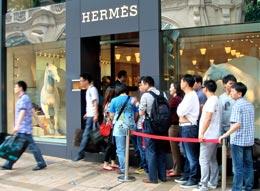Chinese tourists urged to be the epitome of etiquette

Chinese tourists have been reminded by overseas embassies to behave well and respect local laws, regulations and customs during the weeklong National Day holiday.
In a security notice on its website, the Chinese embassy in Canada reminds Chinese tourists visiting the country to dress well, avoid loud arguments and to refrain from drawing graffiti.
"When flights are delayed, these tourists should do their best to understand and cooperate," the embassy said, according to China Daily.
The week-long National Day holiday began last Thursday.
The Chinese embassy in Thailand released a similar notice on its website, saying that anyone traveling overseas with a condescending attitude would "ruin their own image".
Every Chinese tourist should represent the country's image, the notice said, adding, "It is true patriotism to respect other people and behave civilly."
Chinese tourists have a longer vacation this year, with Sunday's Mid-Autumn Festival falling close to the National Day holiday.
Travel agencies including Ctrip.com, China Youth Travel Service and Lvmama.com all said outbound bookings during the holiday had increased by at least by 150 percent year-on-year.
But amid the boom, some Chinese tourist shave triggered controversy with reports of bad behavior, including four visitors who vented their anger in Bangkok on Sept 4 after an announcement that their return flight to Chongqing would be delayed by about 9 hours because of bad weather and technical issues.
China Central Television reported that many scenic areas in Thailand have put up signs in Chinese reminding Chinese tourists to be well behaved.
In April, the China National Tourism Administration started to keep records of bad behavior. So far, 11 incidents have been reported on its website, including six related to tourists in Thailand.
Dai Bin, director of the China Tourism Academy, said more legal measures should be introduced to regulate tourists' behavior.
"Some behavior cannot just be categorized as uncivilized behavior, such as drawing graffiti on ancient relics. Such behavior should be punished according to laws or regulations," Dai said.
China Daily in an editorial more Chinese tourists are expected to travel abroad during the National Day golden week holiday.
This is good news, except that the media have been reporting one incident after another of the uncivil behaviour of some Chinese tourists overseas. Some media outlets have even termed their behaviour, such as jumping queues, talking aloud and spitting in public, as rude.
Indeed, ill-behaved tourists should be condemned, and urged to behave properly, especially while traveling abroad. But it is unfair to condemn Chinese tourists as a whole for the bad behaviour of just a few.
In the first half of 2015, Chinese people paid 127 million visits overseas, and only a small percentage of them were guilty of uncivil behaviour, the paper said.
Not all Chinese people travelling overseas can be accused of uncivil behaviour. Most of them respect and follow local customs and etiquettes, and are well behaved.
In fact, some of the behaviour of Chinese tourists considered “rude” abroad are the result of cultural differences, which can only be bridged gradually.
For example, many Westerners complain that Chinese tourists talk loudly in public, but many Chinese do not realise that talking loudly is uncivil behaviour.
Chinese tourists have earned a bad name also for dining in large groups, China Daily said.
Even in restaurants where tables are arranged separately, they sometimes put tables together to make a bigger one so that they can dine together in a large group.
This is not surprising, because Asians, Chinese in particular, consider dining in large groups to be auspicious. Do not isolate anyone — that’s part of Chinese social philosophy.
But when reminded of Western customs, most Chinese tourists are ready to temporarily sacrifice their traditional beliefs to suit the environment.
And after the National Tourism Administration published the Civilized Behaviour Guide in 2013, an increasing number of tourist guides have been urging Chinese tourists to follow local customs and other social norms.
As a result, most Chinese tourists have become the epitome of etiquette.
But we have to accept the cultural differences.
Eating silently, not breaking queues and keeping in mind the likes and dislikes of foreigners are some of the things Chinese overseas tourists have to bear in mind.
Chinese tourists are not the first to be criticised for their behaviour.
When people from populous countries start travelling abroad in large numbers, it is likely that their behaviour, rooted in their cultures, will be criticised.
Japanese tourists went through the same experience in the 1960s and 1970s because, for example, they rushed into shops to buy luxuries, and South Korean tourists were labelled “noisy” in the 1990s. Today, Japanese tourists are among the most polite in the world. As such, it should not take a long time for Chinese tourists to become one of the best behaved in the world, the China Daily concluded.
In 2013, China recorded 97.3 million departures from the country, marking an 833% increase since 2000.
About 15 million of these outbound travellers left on long-distance trips, with 275,000 tourists—2% of the market—coming to Canada.









